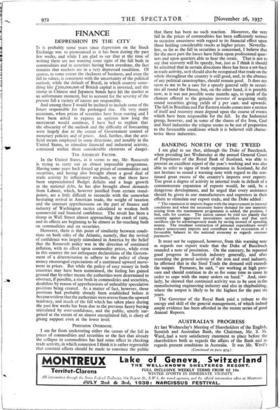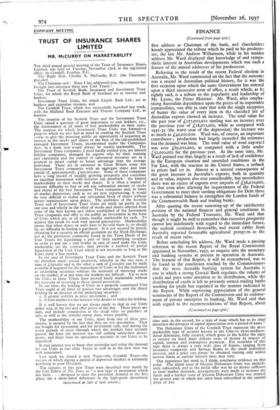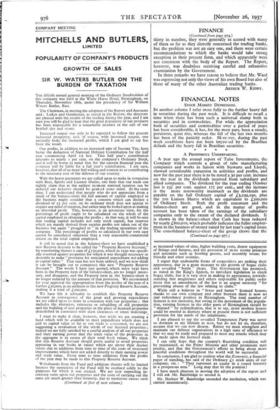FINANCE
DEPRESSION IN THE CITY IT is probably some years since depression on the Stock Exchange was so pronounced as it has been during the past few weeks, and while I am glad to say that at the time of writing there are not wanting some signs of the fall both in commodities and in securities having been overdone, the fact remains that markets are in a very depressed condition. Of course, to some extent the slackness of business, and even the fall in values, is consistent with the uncertainty of the political outlook, while the default of Brazil, in which country some- thing like £200,000,000 of British capital is invested, and the slump in Chinese and Japanese bonds have hit the market at an unfortunate moment, but to account for the severity of the present fall a variety of causes are responsible.
And among these I would be inclined to include some of the forces responsible for the prolonged rise. On very many occasions, when prices of securities have been soaring and I have been asked to express an opinion how long the movement would continue, I have had to explain that the obscurity of the outlook and the difficulty of forecasting were largely due to the extent of Government control of monetary policies and of prices. And, further, that the arti- ficial means employed in some directions, and notably in the United States, to stimulate financial and industrial activity, contained within them considerable elements of danger.
THE AMERICAN FACTOR.
In the United States, as it seems to me, Mr. Roosevelt is trying to carry out an almost impossible programme. Having some years back forced up prices of commodities and securities, and having also brought about a good deal of trade activity by inflationary methods, so that there have been unprecedented Budget deficits and a huge growth in the national debt, he has also brought about demands from Labour, which, however justified from certain stand- points, are a little difficult to reconcile with the somewhat hesitating revival in American trade, the weight of taxation and the constant apprehensions on the part of finance and industry of Washington tactics calculated to weaken both commercial and financial confidence. The result has been a slump in Wall Street almost approaching the crash of 1929, and its effects are beginning to be almost as far-reaching both on commodities and on securities.
Moreover, there is this point of similarity between condi- tions on both sides of the Atlantic, namely, that the revival of confidence was largely stimulated in America by the belief that the Roosevelt policy was in the direction of continued inflation, with its effect upon commodity prices, while even in this country the not infrequent declarations of Govern- ment of a determination to adhere to the policy of cheap money encouraged expectations of a continued upward move- ment in prices. But while the policy of easy money in both countries may have been maintained, the feeling has gained ground that by other means the authorities were determined to obstruct, if possible, a rise both in commodities and securities, doubtless by reason of apprehensions of unhealthy speculative positions being created. As a matter of fact, however, those positions had probably already been established before it became evident that the authorities were averse from the upward tendency, and much of the fall which has taken place during the past few weeks has been due to the previous heavy buying stimulated by over-confidence, and the public, utterly sur- prised at the extent of an almost unexplained fall, is chary of giving support even at the lower level.
PESSIMISM OVERDONE.
I am far from underrating either the causes of the fall in prices of commodities and securities or the fact that already the collapse in commodities has had some effect in checking trade activity, in which connexion I think it is rather regrettable that constant efforts should be made to convince the public that there has been no such reaction. Moreover, the very fall in the prices of commodities has been sufficiently serious to occasion uneasiness with regard to its financial effect upon those holding considerable stocks at higher prices. Neverthe- less so far as the fall in securities is concerned, I believe that for ihe most part the losses have fallen upon professional quar- ters and upon quarters able to bear the strain. That is not to say that recovery will be speedy, but, just as r think it should be admitted that in certain directions there has been a set-back in trade activity, so it should also be recognised that trade on the whole throughout the country is still good, and, in the absence of any political catastrophies, should remain good. It does not seem to me to be a case for a speedy general rally in securi- ties all round the House, but, on the other hand, it is possible now, as it was not possible some months ago, to speak of the chances offered to the genuine investor of acquiring really sound securities giving yields of 5 per cent. and upwards. The fall in Brazilian and Far Eastern stocks comes into a section of itself and recovery must depend upon the course of events which have been responsible for the fall. In the Industrial group, however, and in some of the shares of the Iron, Coal and Steel industries the relapse seems to be out of proportion to the favourable conditions which it is believed still charac- terise those industries.
BANKING NORTH OF THE TWEED I am glad to see that, although the Duke of Buccleuch, when presiding last Wednesday at the annual General Court of Proprietors of the Royal Bank of Scotland, was able to present an excellent report of the year's working and was also able to refer to signs of trade expansion in Scotland, he did not hesitate to sound a warning note with regard to the con- tinued great excess of the country's imports over exports. Too great a degree of activity in internal trade in default of a commensurate expansion of exports would, he said, be a dangerous development, and he urged that every assistance should be given to our manufacturers and exporters in their efforts to stimulate our export trade, and the Duke added :
" The expansion in imports began with the improvement in internal conditions and when the necessary heavy demand for raw materials arising from the rearmament programme is added, the position, I feel, calls for caution. The nation cannot be told too plainly that security against aggression necessitates sacrifices and that such sacrifices can be advantageously made by saving instead of spending money. The resultant contraction of personal expenditure would reduce unnecessary imports and contribute to the restoration of a favourable balance in the national economy as regards overseas payments."
It must not be supposed, however, from this warning note as regards our export trade that ;he Duke of Buccleuch sounded a note of pessimism. On the contrary, he reported good progress in Scottish industry generally, and after recording the general activity of the iron and steel industry, he affirmed that in the Steel Trade the demand still exceeds the output. Furnaces, he said, " are working at high pres- sure and should continue to do so for some time to come in order to cope with the many orders on hand." And, simi- larly, he showed that continued activity was to be seen in the manufacturing engineering industry and also in shipbuilding, where the output is likely to be the highest for the past six years.
The Governor of the Royal Bank paid a tribute to the energy and skill of the general management, of which indeed ample evidence has been afforded in the recent series of good Annual Reports.
AUSTRALIA'S PROGRESS AT last Wednesday's Meeting of Shareholders of the English, Scottish and Australian Bank, the Chairman, Mr. S. M. Ward, had a very satisfactory statement to place before the shareholders both as regards. the affairs of the Bank and as regards present conditions in Australia. It was Mr. Ward's (Continued on page 974-)
FINANCE
(Continued from page 972.)
first address as Chairman of the bank, and shareholders keenly appreciated the tribute which he paid to his predeces- sor, the late Mr. Andrew Williamson, while in his maiden address Mr. Ward displayed that knowledge of and sympa- thetic interest in Australian developments which was such a feature of the annual addresses of his predecessor.
Referring to the result of the recent Federal election in Australia, Mr. Ward commented on the fact that the outcome was a record in Australian political history, for it was the first occasion upon which the same Government has entered upon a third successive term of office, a result which, as he rightly said, is a tribute to the popularity and leadership of Mr. Lyons, the Prime Minister. Mr. Ward, after empha- sising Australian dependence upon the prices of its exportable commodities, was able to state that with the single exception of butter the value of every item in the classified list of Australian exports showed an increase. The total value for the past year of L127,033,000 sterling was an increase over the previous year of L18,000,000, while as compared with 1931-32 (the worst year of the depression) the increase was as much as £42,000,030. Wool was, of course, an important contributor ; production had largely exceeded the estimates but the demand was keen. The total value of wool exported was over k62,000,000, as compared with a little under £52,000,000 for the previous year. At the same time, Mr. Ward pointed out that, largely as a result of lack of confidence in the European situation and unsettled conditions in the Far East, with the reaction in the United States, a setback in prices had set in. Almost as a natural consequence of the great increase in Australia's exports, both in quantity and in value, imports also rose considerably, but nevertheless there was an excess of exports over imports of £36,033,000, so that even after allowing for requirements of the Federal Government to meet their sterling obligations for Debt there was a substantial balance to strengthen the London funds of the Commonwealth Bank and trading banks.
After quoting the recent summing-up of the satisfactory position of the national finances and general conditions in Australia by the Federal Treasurer, Mr. Ward said that though it might be well to remember din excessive prosperity cannot last indefinitely with regard to the immediate future, the outlook continued favourable, and recent cables from Australia reported favourable agricultural prospects as the result of recent rains.
Before concluding his address, Mr. Ward made a passing reference to the recent Report of the Royal Commission appointed in November, 1935, to enquire into the monetary and banking systems at present in operation in Australia. The keynote of that Report, it will be remembered, was to be found in the conclusion reached by the Commissioners that the most desirable banking system for Australia is one in which a strong Central Bank regulates the volume of credit and pays some attention to its distribution, while the distribution of credit is left to privately owned trading banks working for profit but regulated in the manner indicated in the Report. While expressing appreciation of the general sentiments of the Report of the Commission and its endorse- ment of private enterprise in banking, Mr. Ward said that with regard to the recommendations of that Report, about
(Continued on page 976.)
FINANCE (Continued from Page 974.) thirty in number, they were generally in accord with many of them so far as they directly concerned the trading banks, but the problem was not an easy one, and there were certain recommendations to which the banks would take strong exception in their present form, and which apparently were not consistent with the body Of the Report. The Report, however, was doubtless receiving careful and exhaustive examination by the Government.
In these remarks we have reason to believe that Mr. Ward was expressing not only the views of his own Board but also of those of many of the other Australian trading banks.
ARTHUR W. KIDDY.
















































 Previous page
Previous page